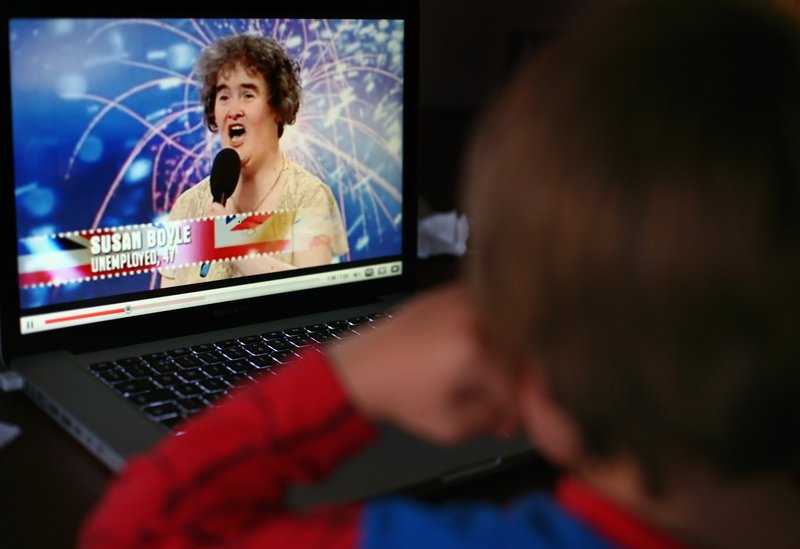我的工作是保護(hù)兒童隱私,我為什么鄙視谷歌

|
在童年時(shí)代,我們中的很多人放學(xué)后和周六的上午都會(huì)看動(dòng)畫片。現(xiàn)在的孩子卻隨時(shí)隨地都能看YouTube。而且YouTube不只有動(dòng)畫片,還有電影、兒歌以及其他孩子玩玩具的視頻。目前在6到12歲的美國兒童中,有80%的人每天都會(huì)看YouTube。YouTube上的很多熱門頻道,如萊恩玩具評(píng)測(cè)(Ryan Toys Review)、啾啾電視兒歌童謠(ChuChu TV Nursery Rhymes & Kids Songs)等,都是以兒童為目標(biāo)群體的。 美國的《兒童在線隱私保護(hù)法案》(COPPA)規(guī)定,兒童網(wǎng)站或是明知其網(wǎng)站正在收集兒童信息的網(wǎng)站經(jīng)營者,需先告知兒童家長他們的數(shù)據(jù)收集行為,并征得其家長的同意。那么谷歌又采取了哪些做法確保YouTube符合《兒童在線隱私保護(hù)法案》的規(guī)定呢?谷歌表示,它不需要遵守該法案,因?yàn)椤癥ouTube并不是兒童網(wǎng)站。” YouTube上有這么多直接瞄準(zhǔn)兒童的內(nèi)容,谷歌卻做出如此不負(fù)責(zé)任的表態(tài),著實(shí)不可理喻。一方面,谷歌的隱私政策寫得十分復(fù)雜,差不多只有法律專業(yè)的畢業(yè)生才能完全看懂,另一方面,谷歌卻把YouTube的界面設(shè)計(jì)得異常簡單,就連6歲的孩子也能輕易地在上面買東西,或是看任何他想看的內(nèi)容。 本周,我所在的“讓童年遠(yuǎn)離商業(yè)活動(dòng)”組織聯(lián)合了其他22家消費(fèi)者組織,向聯(lián)邦貿(mào)易委員會(huì)遞交了一份詳細(xì)的投訴書,要求其就谷歌未能保護(hù)使用YouTube的兒童隱私事發(fā)起調(diào)查。我們嚴(yán)肅指出,谷歌的兒童隱私保護(hù)做得如“狗屎”一般。 劍橋分析公司獲取數(shù)百萬臉書用戶數(shù)據(jù)一事,已經(jīng)將美國人從“科技就是娛樂”的迷夢(mèng)中驚醒。這件事也讓人們意識(shí)到,天下沒有免費(fèi)的午餐,所謂的“免費(fèi)”應(yīng)用和社交媒體平臺(tái),其實(shí)是需要你付出高額代價(jià)的,至少你在一個(gè)龐大模糊的營銷網(wǎng)絡(luò)面前,已經(jīng)毫無隱私可言。不信你就問問你們的亞馬遜Echo語音助手:“給我放一首漢密爾頓的歌,順便告訴我,你知道我過去五年里都去過哪些地方嗎?” 我們的社會(huì)亟需一場(chǎng)關(guān)于如何監(jiān)管科技公司以保護(hù)個(gè)人隱私的大討論。在這場(chǎng)大討論中,首當(dāng)其沖也是最重要的議題便是如何保護(hù)兒童的隱私。兒童在這方面是尤為脆弱的,而總有一天他們也會(huì)成為政治上的成年人。 為何兒童的隱私特別需要保護(hù)?因?yàn)樨澙返氖袌?chǎng)營銷者正是看中了他們心智的不成熟。兒童不理解廣告的說服意圖,所以他們根本抵御不了廣告的誘惑,他們?cè)谕晷纬傻钠放破没驅(qū)⒂绊懰麄兊囊簧I銷人員也知道兒童會(huì)纏著父母買東西,而父母最終會(huì)投降的——這是人的天性,并非父母的失敗。為了瞄準(zhǔn)利潤極豐的兒童市場(chǎng),企業(yè)會(huì)無所不用其極地收集兒童的偏好信息、上網(wǎng)習(xí)慣和觀看記錄。具有聯(lián)網(wǎng)功能的玩具和設(shè)備也是他們用來收集兒童隱私的工具。 那么,家長應(yīng)該怎樣做才能保護(hù)孩子的隱私呢?首先,《兒童在線隱私保護(hù)法案》應(yīng)賦予家長監(jiān)控孩子互聯(lián)網(wǎng)使用情況的權(quán)利,以避免他們的數(shù)據(jù)被收集和分享。在YouTube的問題上,各方需要做的也有很多。 谷歌會(huì)收集YouTube用戶的地理位置、觀看記錄和瀏覽記錄等數(shù)據(jù),然后基于這些數(shù)據(jù)做廣告的精確推廣。用戶必須年滿13歲才能注冊(cè)YouTube的賬戶,但是看視頻是不需要賬戶的,所以這個(gè)網(wǎng)站每天都會(huì)收集幾百萬兒童的數(shù)據(jù)。雖然谷歌不知道這些孩子的具體年齡,但通過觀看習(xí)慣等指標(biāo),卻也不難確定。這些數(shù)據(jù)和分析是最令市場(chǎng)營銷人員垂涎的。所以谷歌通過看YouTube視頻的兒童賺了一大筆錢,但它卻根本不理會(huì)一項(xiàng)旨在保護(hù)兒童網(wǎng)絡(luò)隱私的簡單規(guī)定。 隨著人們網(wǎng)絡(luò)隱私風(fēng)險(xiǎn)意識(shí)的提高,我們希望美國聯(lián)邦貿(mào)易委員會(huì)能迅速對(duì)YouTube發(fā)起調(diào)查,使其遵守《兒童在線隱私保護(hù)法案》的規(guī)定。對(duì)于我們的投訴,谷歌耍了一招太極,先是繼續(xù)指出YouTube并非一家兒童網(wǎng)站,又說它已經(jīng)推出了專門針對(duì)兒童的YouTube Kids應(yīng)用,在這個(gè)應(yīng)用上,家長已經(jīng)可以選擇穩(wěn)私保護(hù)選項(xiàng)了。然而大多數(shù)兒童都沒有聽說過YouTube Kids,他們使用的還是YouTube的應(yīng)用或主網(wǎng)站,他們的隱私仍然沒有得到保護(hù)。谷歌明知這一點(diǎn),卻仍對(duì)侵害兒童福祉的行為視而不見。(財(cái)富中文網(wǎng)) 本文作者David Monahan是“讓童年遠(yuǎn)離商業(yè)活動(dòng)”的活動(dòng)經(jīng)理。 譯者:樸成奎 |
Growing up, many of us watched cartoons after school and on Saturday mornings. Today, kids have YouTube—anytime they want. And it’s not just cartoons: It’s also movies, nursery rhymes, and videos of other kids opening toys. About 80% of children aged 6 to 12 watch YouTube every day, and many of YouTube’s most popular channels, like Ryan Toys Review and ChuChu TV Nursery Rhymes & Kids Songs, are aimed at kids. The Children’s Online Privacy Protection Act (COPPA) requires the operator of a site directed at children or with knowledge that its site is collecting information from children to first give parents notice of its data collection practices and obtain their consent. What does Google do to ensure that YouTube complies with COPPA? Google says that it doesn’t need to comply, because “YouTube is not for children.” Considering the mounds of kid-directed content it offers, the assertion is absurd—as absurd as posting privacy policies that require a law degree to understand, while designing interfaces simple enough for a 6 year old when it comes to buying things or binge-watching. My organization, Campaign for a Commercial-Free Childhood, is part of a coalition of 23 consumer groups that filed a detailed complaint this week asking the Federal Trade Commission to investigate the failure of Google to protect the privacy of children using YouTube. In 2018 parlance, we called “BS” on Google. The news of Cambridge Analytica accessing data of millions of Facebook users has awakened the U.S. out of its happy “tech is fun” slumber, and helped people grasp that “free” apps and social media platforms come at a very high price—loss of our privacy to a vast, opaque network built on marketing. I bet a few people have recently asked their Amazon Echos: “Alexa, play the Hamilton soundtrack, and also, tell me what you know about where I’ve traveled in the past five years.” The conversation about regulating tech companies to protect our privacy is long overdue. Front and center in that dialogue should be the needs of children, who are both particularly vulnerable and who will one day be engaged, political adults. Kids need protection for the same reasons greedy marketers target them. Young children don’t understand the persuasive intent of advertising, so they don’t stand a chance at resisting it, and they’re forming brand preferences now that may last a lifetime. Marketers also know kids will pester parents to buy things, and that parents will give in—this is human nature, not parental failure. In order to target the extremely lucrative child market, companies vacuum up information on children’s preferences and browsing and viewing habits on websites and through Internet-connected toys and devices. What can parents do to protect their children? Well, COPPA is supposed to empower parents to monitor children’s Internet and device use, and prevent their information from being collected and shared. And on YouTube, there is much to protect them from. Google collects data like location, viewing, and browsing habits of YouTube users, then employs it to target ads to them. Signing up for a YouTube account requires you be 13, but you don’t need an account to watch videos, so the site collects data from millions of kids every day. Without asking their age, Google is able, through other indicators based on viewing habits, to identify this data as the extra-profitable kid stuff, which marketers most covet. So Google makes a fortune off of kids watching YouTube, and won’t even meet the simple requirements of the one law meant to protect kids online. With the new enlightenment about Internet privacy risks, we’re hopeful the FTC will swiftly investigate YouTube and require it to comply with COPPA. Though in response to our complaint, Google doubled down on the deceit. The company continues to insist YouTube is not for children, and points to its YouTube Kids app, which has children’s privacy protections as an alternative. But the majority of children are not on YouTube Kids—they’re on the main YouTube site or app, unprotected. Google knows it, no matter what it says to justify turning a blind eye to children’s wellbeing. David Monahan is campaign manager at Campaign for a Commercial-Free Childhood. |













